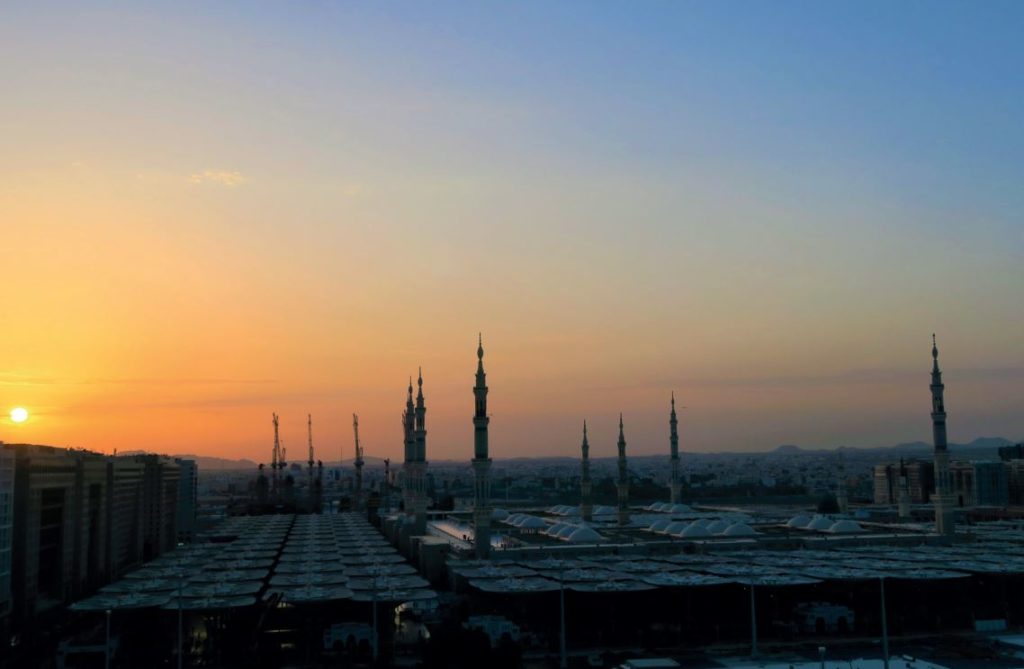“Treat the Copts with utmost respect because we are bound to them in two ways, through blood and through a pledge. We are bound to them by blood because the mother of Hazrat Ishmaelas [Hazrat Hajirahas] and the mother of my son Ibrahimas [Mariyara] are both Coptic.”
(The Holy Prophet Muhammadsa)
Awais Rabbani, Missionary of the Ahmadiyya Muslim Jamaat

Name: Mariya Qibtiyah
Father: Shamun
Sister: Shirin (married to Hazrat Hassan bin Sabitra)
Son: Ibrahim bin Muhammadra
Acceptance of Islam
After the treaty of Hudaybiyya, the Holy Prophetsa wrote letters to kings and governors of different countries to convey the message of Islam. Hazrat Hatibra bin Abi Balta was the emissary appointed to take the letter to Maqauqas, a governor in Egypt.
Maqauqas treated the letter with reverence. It was a custom among the Egyptians that when they wanted to strengthen their ties, they would propose a marriage with the girls of noble lineage. In response to the letter, he sent two girls as a gift to the Holy Prophetsa: Mariya and her sister, Shirin.
During their journey, Hazrat Hatibra explained to them the teachings of Islam, which inspired them greatly. Owing to their pious nature, both the sisters embraced Islam.
A noble child
The Holy Prophetsa married Hazrat Mariyara, and her sister was married to the famous poet, Hazrat Hassan bin Thabitra. In 8 Hijri, Hazrat Mariyara was blessed with a son, Ibrahim. The Holy Prophetsa was overjoyed at the news of this glad tiding. Unfortunately, the child’s health deteriorated. When the Prophetsa was told of his failing health, he arrived to bid farewell to his son and as Hazrat Ibrahimra drew his last breath, the Holy Prophetsa said:
“The eyes send their tears and the heart is saddened, but we do not say anything except that which pleases our Lord. Indeed, O Ibrahim, we are saddened by your departure.” (Sahih al-Bukhari, Hadith 1303)
He consoled the bereaving mother in the following words:
“There is a wet-nurse appointed for him in Paradise.” (Sahih al-Bukhari, Hadith 3255)
At her son’s demise, Hazrat Mariyara was an embodiment of patience and fortitude. It so happened by chance that on the day he passed away, a solar eclipse occurred. People started relating the incident with the death of the Holy Prophet’ssa son. The Prophetsa of Islam was displeased at hearing this and immediately dismissed this superstition in the following words:
“The solar and lunar eclipses do not happen because of the death of a person or because someone is born. When you see them, pray and prostrate before Allah the Almighty.” (Sahih al-Bukhari, Hadith 1043)
The Holy Prophetsa used to say about Hazrat Ibrahimra that if he had lived, he would have been a pious prophet.
A question answered briefly
The question has often been raised as to whether Hazrat Mariyara was a slave-girl or a wife. Whereas it has been mentioned above that it was an old tradition in Egypt that whenever kings or governors desired to strengthen their relationships with their revered guest they would present women of their own family or other noble women of nation to marry. The wedlock of Prophet Abrahamas and Hazrat Hajirara is another example of such case when the chief offered Hazrat Hajira’sra hand in marriage to Hazrat Abrahamas.
The case of Hazrat Mariyara is no different. However, the topic is briefly touched on by Hazrat Mirza Bashir Ahmadra and it is best to reproduce the extract from his book, The Life & Character of the Seal of Prophets.
He writes:
“The question as to whether Hazrat Mariyara was kept by the Holy Prophetsa as a wife or a slave-girl is a matter of disagreement, the details of which we need not delve into here.
“In any case, there are two points which are definite. Firstly, that the Holy Prophetsa instructed Hazrat Mariyara to observe Purdah from the very beginning, and with regard to this injunction, it is established that this was only observed by free women and wives. As such, there is a narration that after the Ghazwah of Khaibar, when the Holy Prophetsa married Safiyyah, the daughter of a Jewish Chieftain, the Companions fell into a disagreement as to whether she was a wife of the Holy Prophetsa or merely a slave-girl. However, when the Holy Prophetsa advised her to observe Purdah, the Companions understood that she was a wife, not a slave-girl.
“The second point to note is that history proves that the Holy Prophetsa never kept a slave for himself, rather he would release any slave that came into his possession, whether female or male. In this respect as well, it is unimaginable and unacceptable that the Holy Prophetsa would have kept Hazrat Mariyara, the Copt as a slave-girl.” (The Life & Character of the Seal of Prophets, Vol. 3, p. 210)
Demise
Hazrat Mariyara passed away in Muharram 16 AH during the Khilafat of Hazrat Umarra. She was buried in Jannatul Baqi. Concerning the treatment of Coptic nations, the Holy Prophetsa is reported to have said in one of the traditions:
“Treat the Copts with utmost respect because we are bound to them in two ways, through blood and through a pledge. We are bound to them by blood because the mother of Hazrat Ishmaelas [Hazrat Hajirahas] and the mother of my son Ibrahimas [Mariyara] are both Coptic.”


Brief but very good article.
But what about the story where Hazrat Aisha and Hazrat Hafsa threatened divorce to Prophet Muhammad.